Noma Dumezweni Works Through the Muck of 'The Undoing'
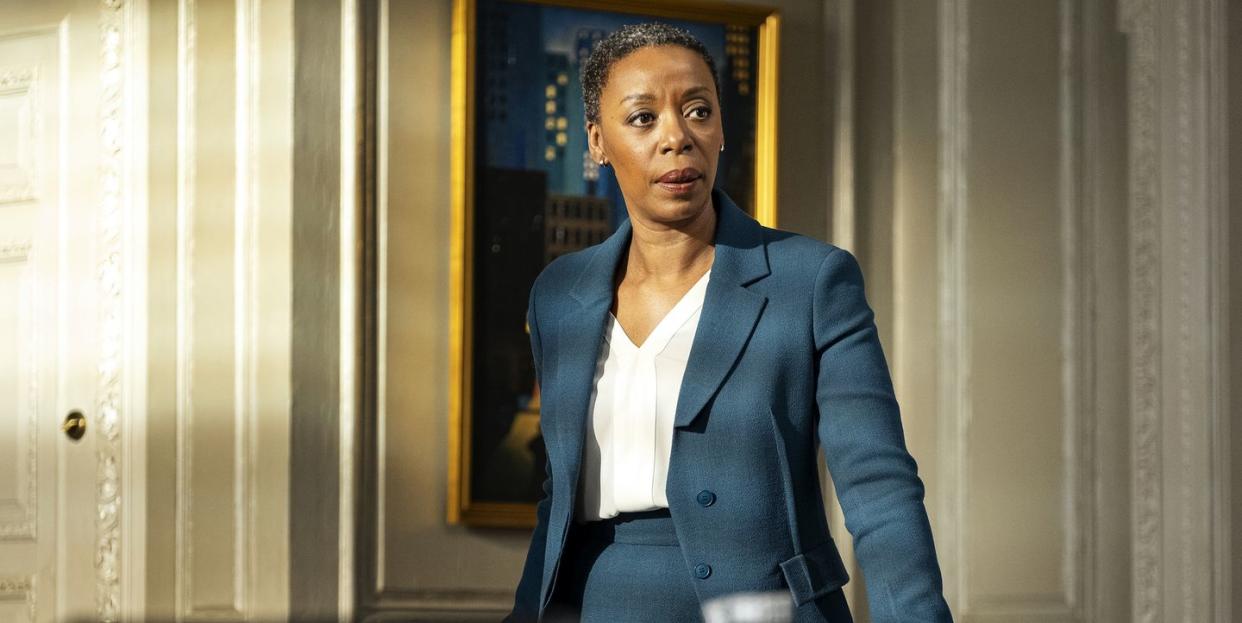
- Oops!Something went wrong.Please try again later.
Minor spoilers ahead.
Noma Dumezweni’s daughter was all of us watching that last episode of The Undoing. "Oh, my God! You did that with a cliffhanger! How could they do that?" the actress remembers her exclaiming. The closing scene revealed that an alleged murder weapon was found hidden in a violin case that belongs to the prime suspect’s son. Does that mean the boy committed the crime? Is he just covering up for his father? Or is there another conclusion to draw entirely? We won’t know until next week’s finale.
“Whatever you think about the show, they’re great at doing the cliffhangers,” Dumezweni, who plays attorney Haley Fitzgerald in HBO’s psychological thriller, tells BAZAAR.com over the phone from New York. She watches the show weekly with her daughter—she says the end of Episode 5 was “done so brilliantly”—but she still has never seen the sixth and final episode, and neither have other cast members.
“What’s interesting, I do know how it ends when I last read the script,” she says. “But by the time I last read the script, it could have changed. I know that there are a couple of scenes that were still to be filmed after I’d finished shooting my stuff. I am so curious.”
Audiences are curious, too, after five weeks trying to solve The Undoing’s gripping mystery: A young mother named Elena Alvez (Matilda De Angelis) was found brutally murdered in her artist studio, and Jonathan Fraser (Hugh Grant), a charming child oncologist who treated her son and also had an affair with her, is being charged with the crime. As one-half of a rich Upper East Side power couple—his wife, Grace Fraser (Nicole Kidman), is a successful therapist—Fraser’s case sparks public interest. The combination of the gory crime, the juicy affair, and his high-profile status turns the case into an outright media circus. Journalists crowd the courthouse; the trial is national news. It’s up to Haley, a composed and calmly intimidating big-shot defense lawyer, to cut through the noise and prove that her client is not guilty.
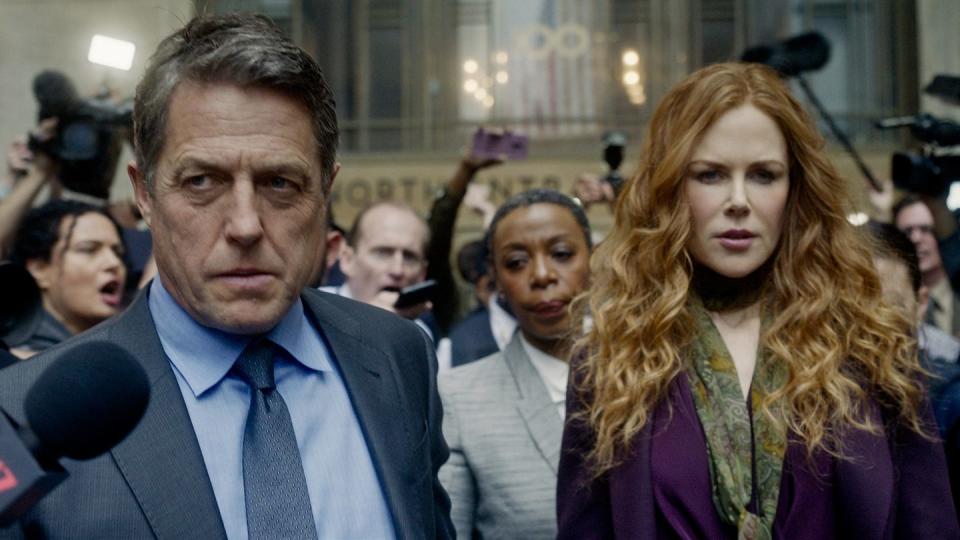
The series, adapted from Jean Korelitz's book You Should Have Known, was created by Big Little Lies’ David E. Kelley and directed by The Night Manager’s Susanne Bier. Dumezweni was hooked on the script even though Haley wasn’t in the pilot.
“I keep saying this: I am so fucking grateful I got the part,” she says. “And I'm still so shocked I got the part. It feels already [like] there's a shift again in how the world meets my work and how I'm going to go into the world again.” The Olivier Award-winning Brit felt the same way after starring as Hermione Granger onstage in Harry Potter and the Cursed Child. “To be in America, doing Broadway, and then I get to do TV in New York, that was like, ‘Okay, this is amazing, it's great.’ Didn't think anything of it apart from, ‘This is work. I'm working with amazing people.' Because then, when I got [the part in The Undoing], that's when I found out Kidman and Grant were on it. And it's like, ‘Ah, fuck!’”
Lively and warm, Dumezweni is nothing like her stoic Undoing character. She’s not afraid to use fuck for emphasis, she jokes about her menopause, and she passionately defends Harry Styles’s decision to wear a dress and dismantles Candice Owens’s definition of what makes a real man. She knows she looks hot onscreen and is also loving her "pandemic food weight." She sends goosebumps through the phone by reading a passage from Kahlil Gibran’s poem “On Children,” which she has hanging on her fridge. When asked if she would have Haley Fitzgerald represent her in court, she doesn’t miss a beat: “Oh, yes. Absolutely.”
Here, Dumezweni discusses sharing scenes with Hugh Grant, her memorable line about “muck,” and imagining Haley’s journey as a Black woman in law.
At this juncture in the story, does Haley have an idea of who might've committed the crime? Does she have her own suspicions?
At this juncture, the one that you've just left off on? No.
She has no idea.
I think she's got a sense, but it's all about the work and what she can do. I think you're going to see in last [episode]. Because, I'm going, "I have no idea what the episode looks like." But I know I remember reading the script and you go, "Oh, right, that's the moment she realizes something." Obviously, I can't say. I remember us filming that, so I'm just curious how it's going to play out again.
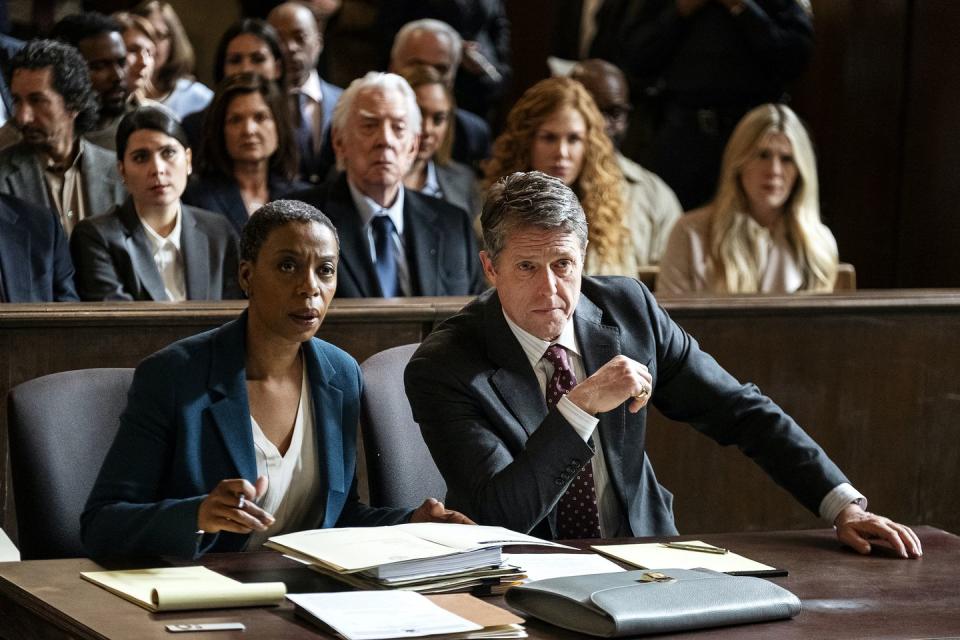
You have a lot of scenes with Hugh Grant. And I think his character is so interesting. The casting, I think, was pretty clever, because you have this very genuinely likable guy as a character at first, and also just as an actor, because everybody loves Hugh Grant. But he's accused of something that's so horrible and hard to believe. What do you think Haley makes of him, what is that relationship like? Honestly, to me it seems like she sees right through his BS.
I think she really does see right through his BS. What I'm alluding to is the fact that you'll find out there's a moment she finds out what the truth is in the whole situation. Because David E. Kelley writes it as well, "How much fucking charm do you think you have?" And that's what it is. And you can go, oh, my God, the arrogance of—I was going to say a middle-class, upper white male or whatever. Just that, you're the white male in society who gets all that. And now look, those are my words putting on there. Those obviously aren't David E. Kelley's words. Haley Fitzgerald could have been played by anybody. And that changes the telling of how you speak that language. But I loved that. Also the fact that she goes, "Oh, I'm going to use this to my advantage."
So then it becomes about how Haley works for me. And she goes into the world. Because I'm going, "Oh, that's why you're good at your job. Oh, that's great." Just that scene in the office after she's met him in the prison. And she's testing his boundaries of who he is. After she discovered he's been at Fernando Alves's house—what the fuck!—you just pulled it out and I love that. It was one of my very early scenes to film, because these things are filmed out of sequence.
In terms of going back to the question, working with Hugh Grant and him being the guy that he is and the character that he's playing. I do think it's really clever casting. Hugh Grant's become this character actor. And I mean that with absolute respect, because that's what you want. And it's almost like the same thing people have said of Ewan McGregor or Brad Pitt. They're character actors in beautiful bodies. But now, he's met his age and set in his age and he's a grown father, later in life. Did you ever see A Very English Scandal?
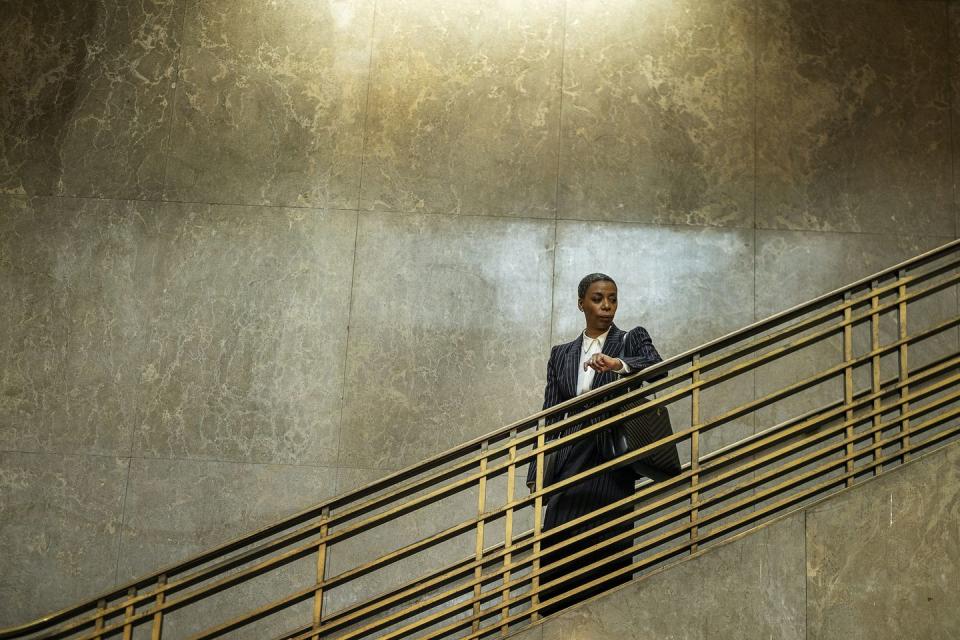
No, I haven't. It’s on my list.
Oh, my God, please do. Because that's when you realize what a character actor he is. Because there's still wonderful, happy, the beautiful Hugh Grant and the English charm and everything. But that's an absolute study in a balding head, how a hat hangs on the head, the lines that he has. And there is no vanity, that's what I mean. There was no vanity about Hugh and that's what I love. Just as a person, there's no vanity about him. I really enjoyed that. But his character is amazing as well. I mean, they all are.
There's a scene in Episode 3 that sticks out to me, where you had a great monologue when you were talking to Grace about giving the family muck, that's your job. “That's what I can give you and your husband, muck.” And it was really powerful. I just wanted to know a) did you know it was going to be iconic? And b) how did you approach that scene?
Sweet Jesus, no, not at all. Again, we go back to the writing when you have got language like that. Well, this is what the rich people do, hold onto their interests. You're going to go serve it because Mr. Kelley's serving it in the script. And I get to say it to this woman, not Nicole Kidman, but this woman, Grace, who comes in and is actually so protected in her world. I understand the relationship I have to Grace and therefore to Franklin, her father. Obviously, you realize this guy's is loaded, shit-loaded. And then he's asking me, "Can you help my daughter in this case?" All right, let's have a see what this is. I love the idea that Haley is in this company. It's a silent company that does very intense work for people. It's the only way I could describe it. And that's healthy for them in terms of finance.
There's a line when she says, "I'm not funny." And I remember going, "Oh, I hope I've done it. I think I know what it feels like, but I hope it reads what it feels like." And then just to say the word muck, just at the end of a line. I love that. Of course again, it's the language. It's how it's laid out. How David sets up that language. So, this is what I do, this is me, muck, I'm going to give you muck. And I'm going, "Oh, my God, people really like that." Because I am now getting things like, "Hello, mucky lady!" [Laughs.] It does make me laugh. Or someone just said "mucking magnificent." I was like, "Okay, that's great, I'll take that." So it's lovely, we never know these things. And it's the character of Haley. That's what it is. Noma's just doing her job.
How did you prepare for this role? Because the court scenes looked really intense. Did you read up on any real cases or briefings, or look up real defense lawyers?
Oh, yes, we did. The production company was very good. I remember Celia Costas, one of our producers, got me to talk to a friend of hers who had been originally a prosecution lawyer and was now a defense lawyer or something. I can't quite remember, forgive me because I can't remember the name. But just even having that conversation was fantastic. And he took me and Sofie Gråbøl [who plays prosecutor Catherine Stamper], to [observe a hearing in court]. Because I didn't realize any human being can walk into a court and watch what's happening. ... But you can actually just walk in, as long as you're respectful and quiet and listen and observe to literally live theater in front of you. Although, unfortunately people's lives, for good or bad, are going to be affected by what's going on in front of you. So that was great to go and watch a couple of sessions there.
Jim Walden was a very helpful lawyer as well to speak to, who was a prosecution defense and worked in [the Department of Justice]. He's worked in different levels of government as well as in his own practice. Really fascinating guy. And I just remember him saying, you must use what you know in the theater when you go into the courtroom, when there is an audience now. We are very aware that there are just some lines you want to push up and punch up, and feed directly to the jury. Because they are your audience. So even the little things like that were really, really helpful.
And then I remember going to talk to this amazing woman [Karol Mason]. She’s the head of John Jay College. She was fantastic because she is a Black woman, she's a lawyer. And I want to say, she's a very good friend of Valerie Jarrett. That was fascinating to be in her room. I think she had worked with Obama at some point in his tenure. I was looking at this Black woman going, "You're amazing," just listening to her story. That was good for me. And I do I mean this, [the role of] Haley Fitzgerald could have gone to anybody. I'm the one who was lucky enough to get it. And I happened to be a Black woman playing an African-American woman. So I have to do my homework and I have to put myself in a place and go, "Well, what's that like?"
Did you see yesterday, Hasan Minhaj was trending on Twitter? There's a lie detector video that he'd done for Vanity Fair.
Yeah, with the Dax Shepard photo.
Yes. I'd never seen it. But it's what he says, "Look, Dax Shepard is going to get so much better than I will, although I've got to work a lot harder and be a lot more good looking." And I watched that for the first time and went, "Oh, my God, I've never seen it, but it's so fucking true." Because Hasan was so humble about it, that he didn't lie. And there were no lies detected in that. I look back on Haley's journey for me and I go, I've got to understand where this Black woman ended up. How did she end up? It's not for you to see, it's not for you at all to see. But it's for me to know how she ended up in this space. And that's lovely because there's loads of human choices that come with that.
And I haven't seen How to Get Away with Murder. [Laughs.] I still haven't, I should catch up with that now.
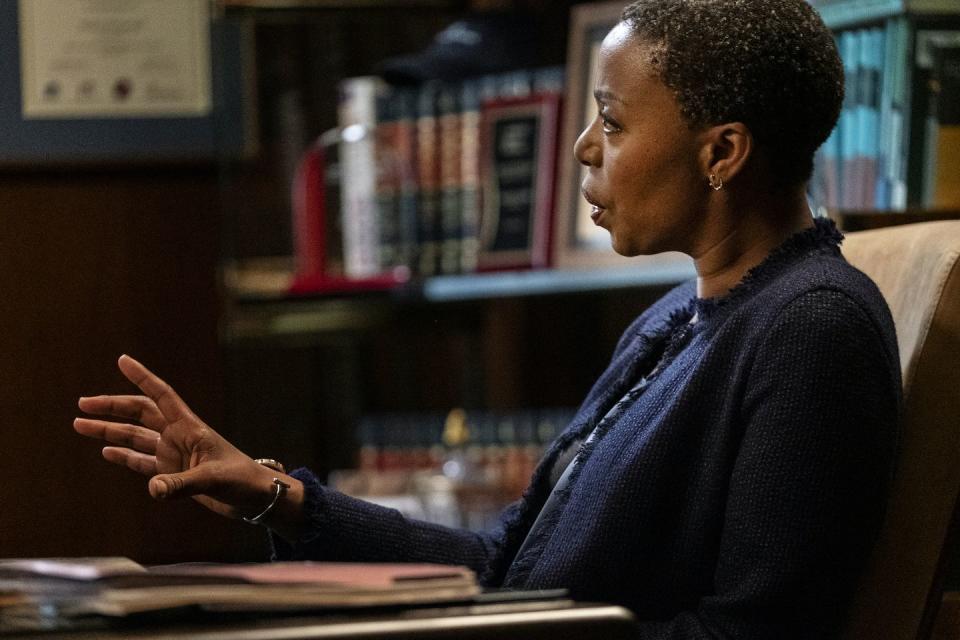
You were saying meeting Karol Mason helped you build backstory for Haley. What do you imagine her journey was like to get to this position?
I remember finding out about Florynce Kennedy. I didn't know about Florynce Kennedy up until last year, she's fascinating. She was with Gloria Steinem, she's an extraordinary queer woman who fought and nearly sued Columbia for not putting her into a class as the only Black woman out of all other women. Because I think it was down to the race thing; we're talking about the '40s, '50s here. So I heard about this character last year before David's show. And I was like, who the hell is this woman, Flo Kennedy? Flo's almost too much of a wild card to put into Haley, because there's a different choice, and Hayley's gone corporate. Flo was absolutely for the people and of the people.
So for Haley, she would have known about Florynce Kennedy and the rights of people that she fought for. I like to think there's a moment in time that Haley went, "I need to earn some good moolah and not think but do." Because her mind is great and how she's been written. Just that whole thing about muck, put the burden of proof on the law. That's clever, I like that.
With my dialect coach, Jerome Butler, he was just going, "Which part of America did [Haley] grow up in? Which part of New York did she grow up in or go to study? What's the journey she could've had? Where is this voice from?" Because, of course, it's my voice, still trying to get the American accent in. I would say Flo Kennedy was a reference, although she's the absolute opposite. I think people need to find out about Flo Kennedy. She was a fascinating woman, oh, my God. And bright as fuck.
Obviously, I don't know the ending, you don't know the ending. But considering the fan base of the show and the fact that this is a limited series of only six episodes, it seems like the viewers are going to want more after the finale. Do you think there's space for another season? Would you be interested in one?
Oh, my God. In my head, it was a limited series, we've done the storytelling. And I don't think there is. But let's see how that tracks and translates to the visuals that I'll be seeing next week for the first time. I'm really curious. And I do love that idea, but it's just a different world. But where would you focus it on? Do you still focus it on the Frasers? Do you still focus it on the courtroom? Do you focus it on the school? You've been given this whole world of possibilities. But how do you carry on a second series when it came from a specific moment of school and the parents? And what I love about it is, the social commentary, ultimately.
It is the cheek by jowl of any great city where you are living with high wealth and absolute low poverty, and we're somewhere in between that. Just nearing the edges, but not on the edge. ... So I don't know, you'd have to think about what is that story, because you can't replicate what you've had.
This interview has been edited and condensed for clarity.
The Undoing airs on Sunday at 9 p.m. on HBO.
You Might Also Like

